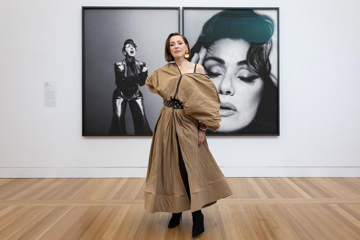Robert Plant: Strange Days.

I Have A Dreamland.

Dreamland is in stores now.
The legend of Robert Plant is as unending and unyielding as the stories that are told of Led Zeppelin and the man with the big voice, that testosterone-fuelled wail from the other side of Valhalla, and the long, mane that tumbled in waves down his back and across his shoulders. Stories of Robert and women, lots of them if rumour be truth, of wonderful rock'n'roll mystic forays and adventures, of a lifelong friendship with his guitarist mate Jimmy Page. And they reek of wonderful places, of Kashmir, Morocco and India, the Arabic/Middle Eastern connection that so informs their later works. Robert Plant, superstar on the stairway to heaven he built for himself.
Now there is a Dreamland, a place for Plant that he shares not with acolytes from the glorious past but fresh new mystics to his world. Suitably named Strange Sensation they include former Cure guitarist Porl Thompson, bassist Charlie Jones, drummer Clive Deamer (Roni Size, Portishead), keyboardist John Baggott (an Emmy-winning soundtrack composer) and guitarist Justin Adams (The Wayward Sheikhs).
Dreamland features 10 songs - seven covers, three originals - but it is far more than just a covers album with an edge. Page deconstructs the songs he's chosen to the point where they are bidden to raise anew on the wings of some '60s stew of psychedelia, folk-rock and blues.
"These new, new old songs I've been carrying around in every form and format since the days they were released originally," he says. "In my history as a singer and as a writer, a lot of the music I've been involved with has had a blues base. The songs have a lot of heart and come from a time that was very influential and had a major effect on my life and my appreciation of what music can be responsible for.”
"It was a time of social commentary in America; the mid to late '60s was a pretty heavy time out there and popular music rose to the responsibility of actually having a voice. I wanted to put myself and the musicianship of the people around me into these tunes and bring some new life out of 'em.”
“There was a lot of exchange in the late '60s; you find singers singing completely out of character. It's funny, you'd get artists as diverse as Mama Cass, Neil Diamond, Nilsson, in that kind of post-hippie mainstream going back into the culture and digging out real diamonds and gems to play. A very important part of this is that these were - and still are - very beautiful songs, written in a different time, written with a different intention from a different headspace altogether. As a singer rather than as an accomplice, these songs have given me an opportunity to sing, sing. So I could push the fader in the mix and push the voice up because it's about melody and it's also about the weave that surrounds the melody, the sort of lure and intoxication of the music. The whole empathy between the instrumentation and the lyric and the theme. Whilst getting involved in that as a kind of trip we were able to find our own flair to write.”
His explanation is as pointed as it is honest. Robert Plant in 2002 isn't trying to define the future; he is taking the past and offering to the present in the hope that it will be carried into the future. The simple essence of taking greatness as a starting point and adding it to the river of music that rushes through 2002 may make modernists cringe but for anybody with a sense of history and the greatness inherent in the very best of music it is a welcome addition.
Whatever Plant does, his previous act will always be hard to follow. Legendhood dictates that the source of legend will always hog top billing. That doesn't mean though that there isn't space for something bold and brave. Dreamland sits and fits comfortably with Plant's musical past. Play Led Zeppelin I or Led Zeppelin II and you'll find that Dreamland won't sound out of place just as it won't if played next to No Quarter.
"I feel I had to step out of character a little bit," he says. "I feel to take on these songs I really had to go at it with a fresh canvas and while it's true there are references to everything I've done from 1967 onwards, the only difference is in the priorities of this music. There are moments that peak and the peaks are coming from a different angle than they ever did before.”
"Truly though, from 1970 when Jimmy and I went to India and recorded with the Bombay Symphony Orchestra to recording in Morocco in the mid-1970s taking recording equipment around the desert, the stuff I'd done with and without Jimmy with the Moroccan guys, the whole recent adventure with the Afro-Celt Sound System for Real World, and now I'm about to play harmonica with Primal Scream, I find it all very comfortable and easy to move around because everything comes from a similar root in the end.”
It seems fitting then that Robert Plant should take on these songs and give them a new reading. Even he knows the originals will always stand strongest, he also knows that this strange sensation he seeks – and has sought for so long – has fired off a new link in the railroad of rock'n'roll.
"I am very at home with this, and there is a continuum, it is just that the colours are perhaps a little bit different and the brightness is different on this record. I've also never been quite as happy with a collection of songs and the honesty of the whole deal for a long, long time."







